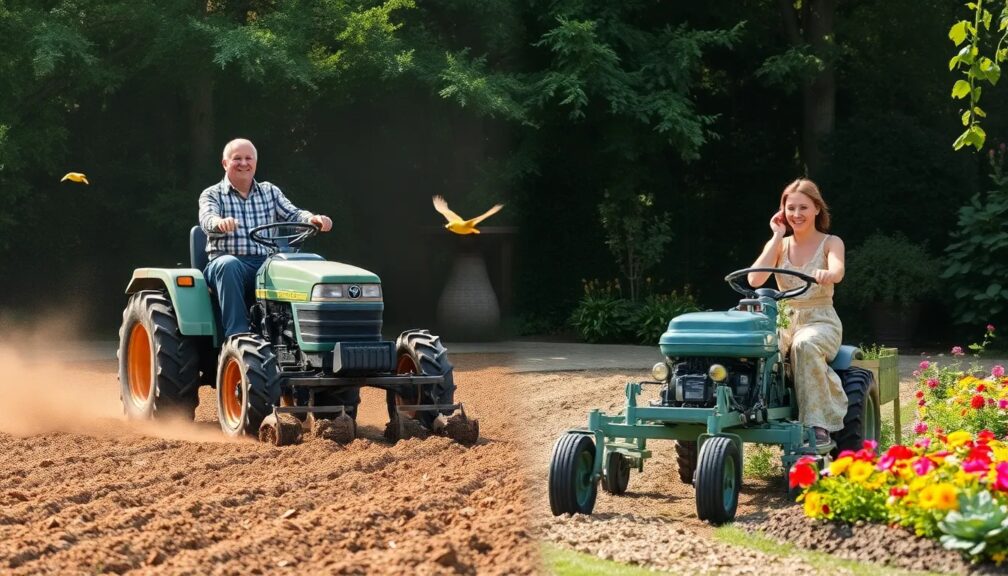What is the difference between a tiller and a cultivator

Gardening and farming are activities that require not just knowledge of plants, but also an understanding of the tools that help make cultivation more efficient. Among these essential tools, tillers and cultivators are critical for soil preparation and maintenance. Although they may appear similar at a glance, and are sometimes used interchangeably, each serves a unique purpose in the upkeep of a garden or farm. In this article, we delve into the specifics that distinguish a tiller from a cultivator, from their design and functionality to the situations in which each tool excels. Whether you're a seasoned gardener or just starting out, understanding the difference between these two tools can lead to more effective gardening practices and a flourishing outdoor space.
Do I need a tiller or cultivator?
The question lingers in the minds of many avid gardeners and aspiring green thumbs alike. As you stand on the brink of transforming your outdoor space into a lush oasis, you realize that the success of your garden hinges on the preparation of the soil. Striking the perfect balance between the earth's texture and nutrient mix is pivotal, and this is where the decision becomes crucial.
Tillers are the heavy-duty champions of soil aeration. They can break new ground, tear through tough soil, and even chew through compacted earth to create the perfect bed for planting. Whether you're starting a new vegetable patch or revamping an overgrown garden, tillers can give you a clean slate.
On the flip side, cultivators are nimble soil caretakers. They specialize in stirring and pulverizing the soil, making them indispensable for blending in compost or manure and for the careful maintenance of flower beds and vegetable rows. For the upkeep of an established garden, cultivators make nurturing your earthly paradise less of a back-breaking task.
So, as you contemplate the transformation awaiting your garden, imagine wielding the power to craft the ultimate environment for your plants to thrive. The decision between a tiller and a cultivator could be the key to unlocking a bountiful and beautiful garden.
Don't let indecision hold you back from experiencing the full potential of your green space. The right choice can revolutionize your gardening experience, turning laborious digging into a thing of the past. Your neighbors will marvel, and your plants will thank you. So, take the next step—learn which of these mighty tools aligns with your gardening goals, and let the journey begin.
Can you use a cultivator as a tiller?
Transforming your garden into a haven of productivity starts with the soil. And for the uninitiated, the quest to create the perfect bed for planting might just lead to the ultimate question: The secret interplay between cultivators and tillers lies at the heart of this mystery. The answer is nuanced and, depending on your gardening needs, could revolutionize the way you approach soil preparation.
A cultivator typically shines in the realm of lighter tasks: stirring soil, weeding, and integrating compost. It's a champion of the garden during the growing season, making it simple to maintain plant beds with minimal effort. However, the plot thickens when you consider its potential for heavier duties.
Imagine your garden's soil, compacted and untouched, waiting for a transformation. This is where the tiller enters, designed for deep soil disruption, turning over and breaking new ground. But what if you only have a cultivator at your disposal? The question isn't merely one of possibility but of practicality and efficiency.
With careful consideration, a cultivator can, indeed, step into the role of a tiller. But it's not just about the "can" – it's about the "how." To dive into the depths of altering your cultivator's destiny, you'll want to know:
1. The type of cultivator you own and its capabilities.
2. How to modify your cultivation technique for the best results.
3. The limitations that come with using a cultivator for tilling.
Intrigued yet? The intricacies of such a switch could mean the difference between a flourishing garden and a mediocre one. Understanding the subtleties of garden tools could be the turning point for your green-thumbed pursuits.
Stay tuned as we unearth the steps to take your cultivator to the next level, ensuring that your garden remains a constant source of pride and produce. It's about to get deeply fascinating – quite literally – and you wouldn't want to miss out on the transformative knowledge that could elevate your gardening game to masterful heights.
Will a cultivator go through grass?
The answer to this question might seem straightforward, but the truth lies beneath a layer of intrigue that every garden enthusiast should be keen to uncover. Imagine standing before a verdant expanse, your garden whispering secrets of growth and life. Yet, a challenge presents itself – a blanket of unruly grass. This is where the might of a cultivator leaps into action, but will it be the hero your garden needs?
As you delve deeper into the world of gardening, you'll discover that a cultivator is more than just a tool; it's a key ally in your quest for horticultural perfection. The suspense grows when you consider the possibilities – the ease of tilling soil, the promise of invigorating your land, and the potential to weave through grassy obstacles with finesse.
The power of a cultivator can be awe-inspiring, yet it demands respect and knowledge to harness its full potential. Whether you're dealing with delicate flower beds or tackling tougher terrain, knowing the capabilities and limitations of your cultivator can make all the difference.
Stay tuned as we dig deeper into the heart of this gardening conundrum. The journey through understanding the true might of a cultivator against the persistence of grass will be thrilling, filled with tips, tricks, and revelations that could change the way you engage with your garden forever. Don't let the grass stand in your way – uncover the secrets to mastering your outdoor sanctuary. The answer awaits, and your garden's transformation is just on the horizon.
Will a cultivator break up hard ground?
Unlock the secret to transforming your unyielding soil into a fertile haven for your garden dreams. If you're staring out your window at a backyard that's more concrete battlefield than lush paradise, you might be wondering if there's a tool that can penetrate that stubborn earth. Enter the cultivator, a game-changer for garden enthusiasts and the answer to your soil woes.
Imagine wielding the power to revitalize your garden's foundation. A cultivator comes armed with the strength and precision to churn and aerate even the toughest terrain. But not all cultivators are created equal. To truly leave your neighbors green with envy, you need to choose the right type for your land's specific challenges.
Here's what a cultivator can offer:
- Efficiency: With sharp, rotating tines, this tool dives deep, slicing through clumps and creating a bed that your plants will love.
- Root-friendly: While breaking the surface, it takes care not to harm the precious roots below, promoting healthier plant life.
- Adaptability: Whether it's a gas-powered beast or an eco-friendly electric model, there's a cultivator to suit your needs and conscience.
But there's more to this story than just brute force. The technique, timing, and even the weather play pivotal roles in the success of your soil transformation. Curious about how to harness all these factors in your favor? Stay tuned to uncover the tips and tricks that will elevate your gardening game to the next level!
Tiller vs cultivator vs rotavator
Have you ever found yourself standing in the gardening aisle, overwhelmed by the options, and asking, "Which one do I need to bring my garden to life?" The secret lies in understanding the subtle yet critical differences between a tiller, a cultivator, and a rotavator.
When it comes to preparing your garden, knowing which tool to choose can mean the difference between flourishing greenery and a disheartening yield.
First off, let's talk tillers. These powerhouses are designed to break new ground, tear through tough soil, and get your garden bed ready from scratch. They're not just tools but garden game-changers. Picture your new garden space transforming from an untamed wilderness into a ready-to-plant haven.
Now, consider cultivators. These are the go-to for maintaining and stirring your already established planting areas. They're perfect for weeding, aerating the soil, and incorporating compost. Imagine your garden soil becoming lighter, more nourishing, and ready to support a bumper crop.
Finally, the rotavator – often confused with tillers but distinctly different. With their deep-reaching tines, these machines are thorough, turning the soil and ensuring a level of preparation that's second to none. If you're looking for that pristine garden bed, a rotavator might be your best ally.
But don't just take my word for it; your garden is waiting to reach its full potential. With the right tool, you're not just planting seeds, you're cultivating a personal paradise. The question is, are you ready to unlock the secrets of the soil and become the envy of green-thumbed enthusiasts everywhere? Stay tuned, because we're just scratching the surface of garden mastery.
Consejo final: When choosing between a tiller and a cultivator, consider the size of your garden and the nature of the work to be done. Use a tiller for heavy-duty tasks and breaking new ground, while a cultivator is ideal for stirring the soil, weeding, and blending compost. Ensure whichever tool you select fits your gardening needs for a more efficient and enjoyable gardening experience. Wishing you a bountiful and rewarding time in your garden!
 What is the best tool to loosen hard soil
What is the best tool to loosen hard soil What is the best tool to break up compacted soil
What is the best tool to break up compacted soil What is the most important tool every gardener should have
What is the most important tool every gardener should have What is the best layout for a vegetable garden
What is the best layout for a vegetable garden What do I need to start gardening
What do I need to start gardeningIf you want to know more about similar articles like What is the difference between a tiller and a cultivator you can visit category Gardening Tools.
Deja una respuesta